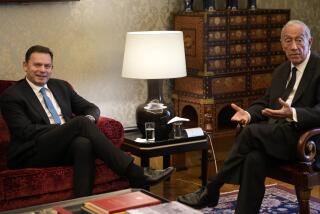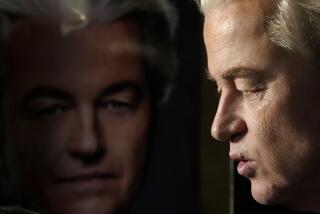Palme Narrowly Reelected Sweden’s Prime Minister
- Share via
STOCKHOLM — Prime Minister Olof Palme and his Social Democratic Party, turning back a strong challenge from parties demanding lower taxes and less spending, won reelection Sunday with a narrow victory in Sweden’s parliamentary elections.
According to nearly complete returns reported by Swedish television, the Social Democrats won 44.9% of the votes and 159 seats in the Parliament. With the help of the Communists, who vote with the Social Democrats and won 19 seats, the 58-year-old Palme will have 178 seats, a majority of seven in the 349-seat Parliament.
Palme called the victory “fantastically splendid for us,” describing the results as “a vote of confidence in the economic policies of the third way.” By this, he meant that voters had once again endorsed the Swedish welfare state, which he sees as a middle road between a strictly socialist state and a strictly capitalist state.
Non-Socialists Gain
The three non-socialist parties, which tried to make inroads with separate campaigns calling for lower taxes, cuts in spending, and more freedom of choice in the Swedish welfare state, gained eight seats under Sweden’s system of proportional representation, for a total of 171.
The opposition parties have thus forced Palme to depend more on his Communist allies. In the past Parliament, Palme’s Social Democrats had enough seats to outvote the parties on its right even if the Communists abstained, but that will not be true in the new Parliament.
The situation, however, will not be a new one for Palme. Swedish elections are traditionally close, and the Social Democrats have had to depend on the Communists for their majority before.
Welfare State Endorsement
Palme, who has served as prime minister for a total of nine years--from 1969 to 1976 and from 1982 until now--interpreted the victory as a strong endorsement of the welfare state and the rejection of the free enterprise policies of such foreign leaders as Prime Minister Margaret Thatcher of Britain and President Reagan.
A year ago, public opinion polls indicated that the electorate, chafing under high taxes and listening to opposition proposals for more freedom of choice in the welfare system, would turn Palme and his Social Democrats out of power.
But Palme, in a campaign that staunchly defended the welfare state and tried to tar his opponents with what he called the “neo-liberalism” of Reagan and Thatcher, managed to turn public opinion back in his favor.
Emergence of a Liberal
For many Swedes, the most interesting result of the election would probably be the emergence of a new leader on the right, 38-year-old Bengst Westerberg, the head of the Liberal Party. A businessman with a much smoother television manner than most Swedish politicians, Westerberg led his party to a spectacular gain of 28 seats, making it the second largest party to the right of the Social Democrats.
Westerberg, who tried to make freedom of the individual the main issue of the campaign, told Swedish television after the results were clear: “We wanted to do well ourselves. But we also wanted to change the government. So it’s only a half victory.”
Westerberg’s Liberals took the seats mainly from his allies, the Moderate Party, as the former Conservative Party now calls itself, and the Center Party.
Swedish television reported this makeup for the new Parliament, which will serve for three years: Social Democrats 159 seats, Communists 19, Moderates 76, Liberals 51, Center 44.
More to Read
Sign up for Essential California
The most important California stories and recommendations in your inbox every morning.
You may occasionally receive promotional content from the Los Angeles Times.













